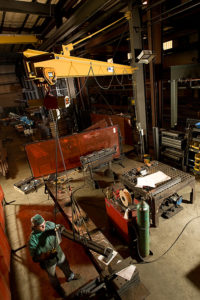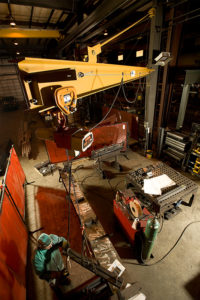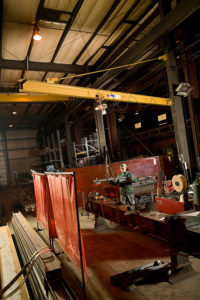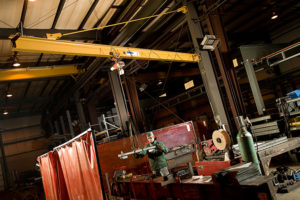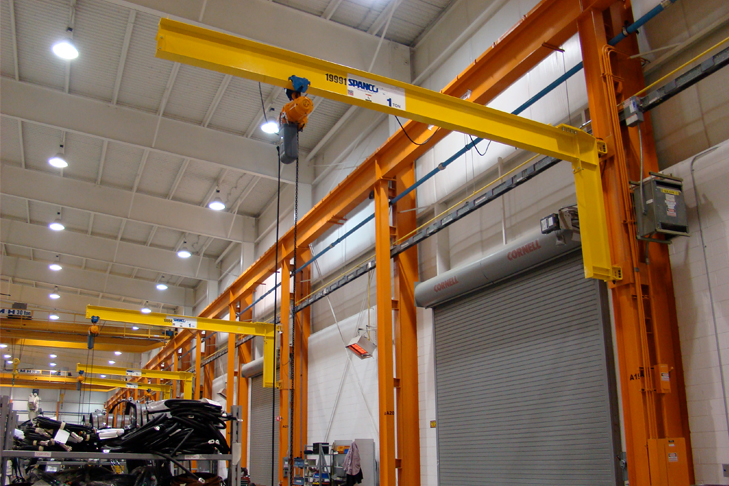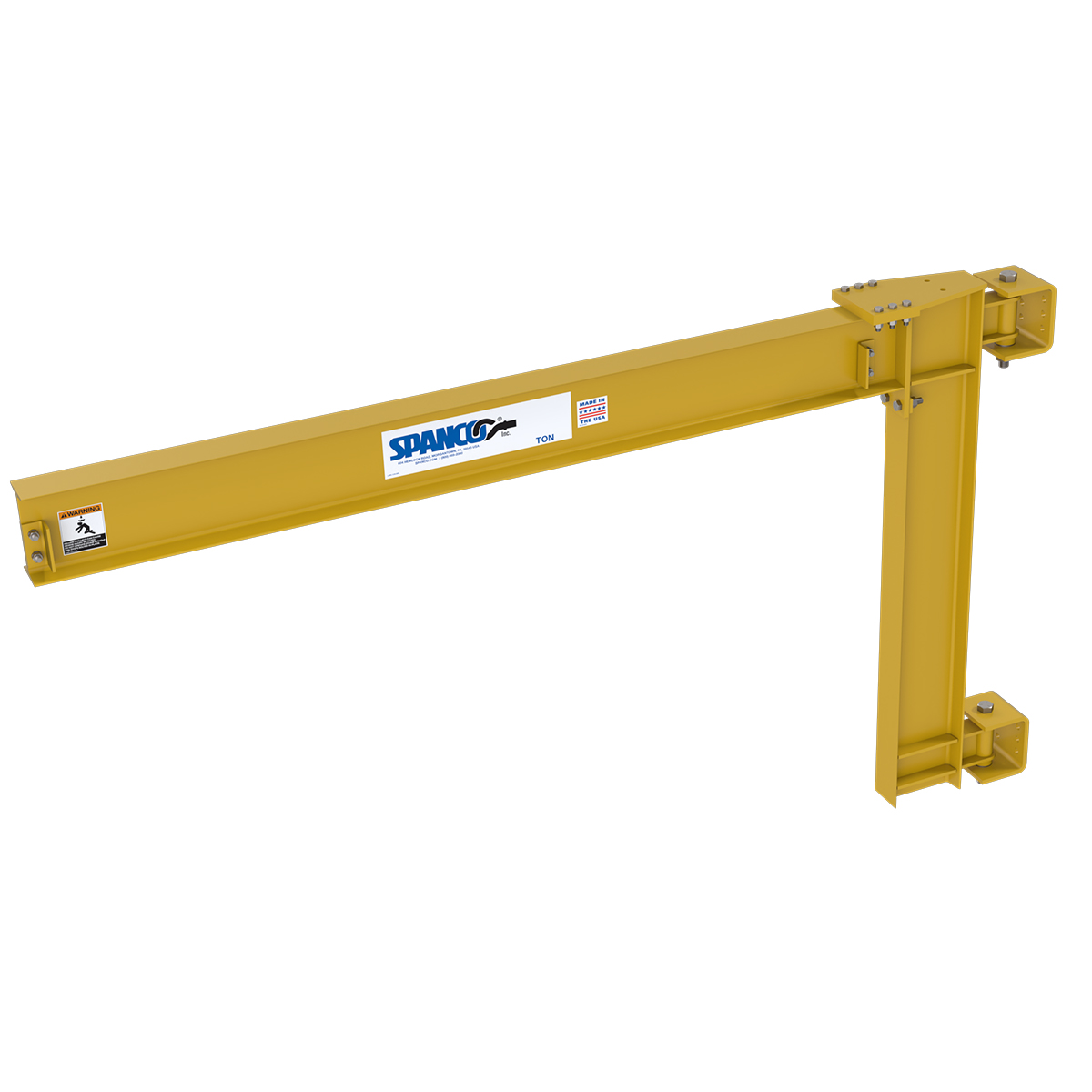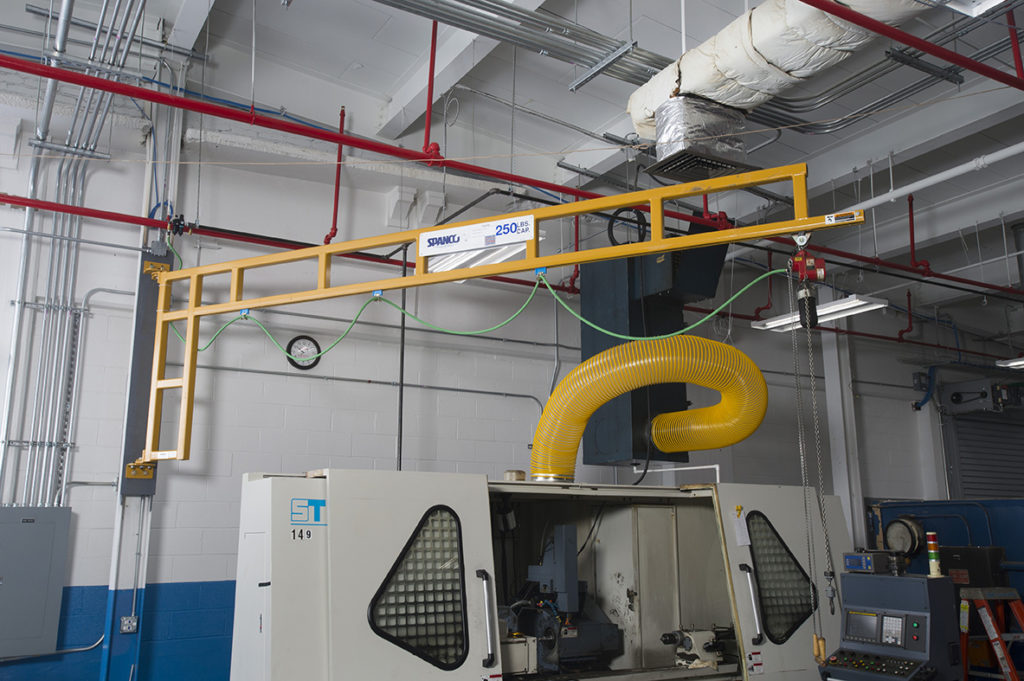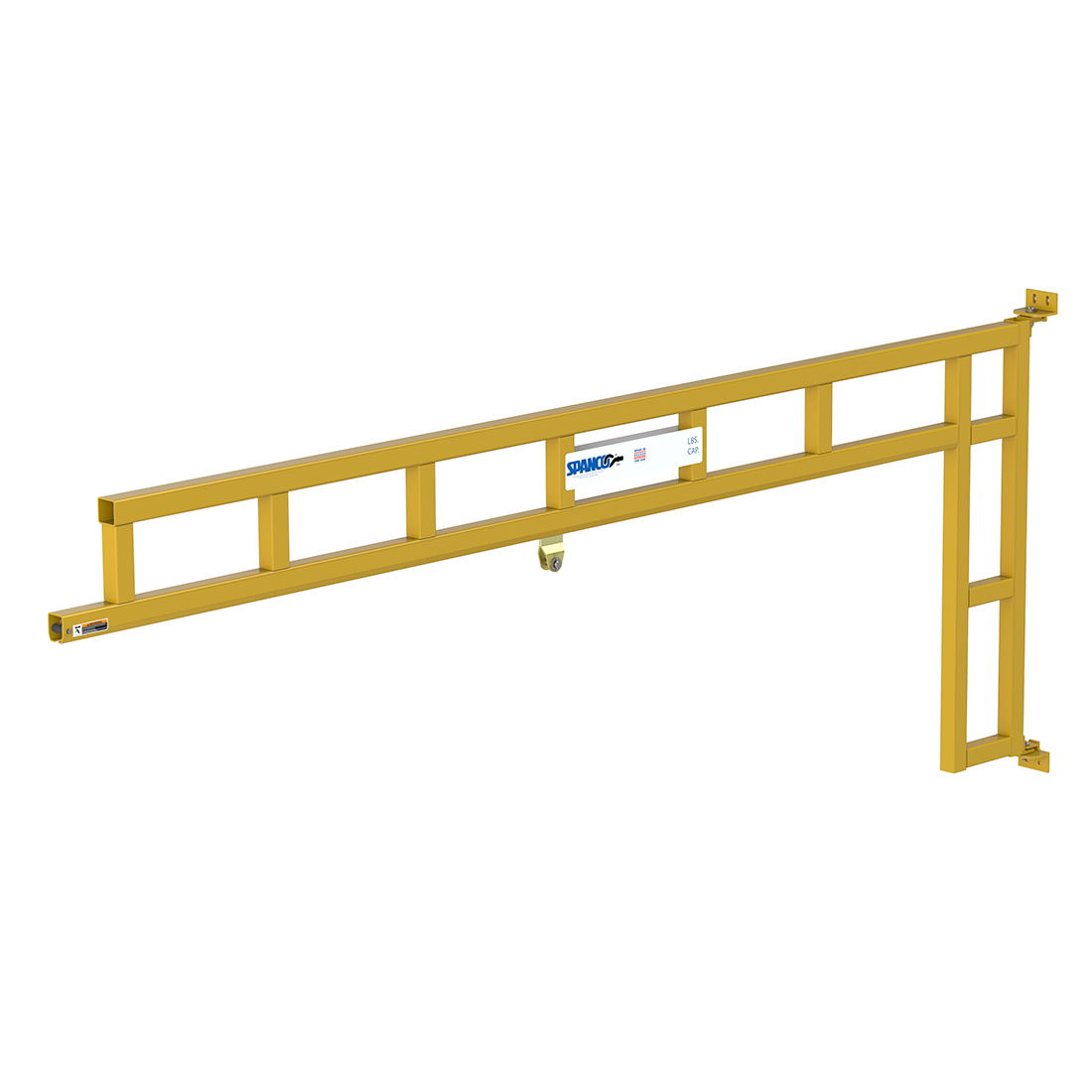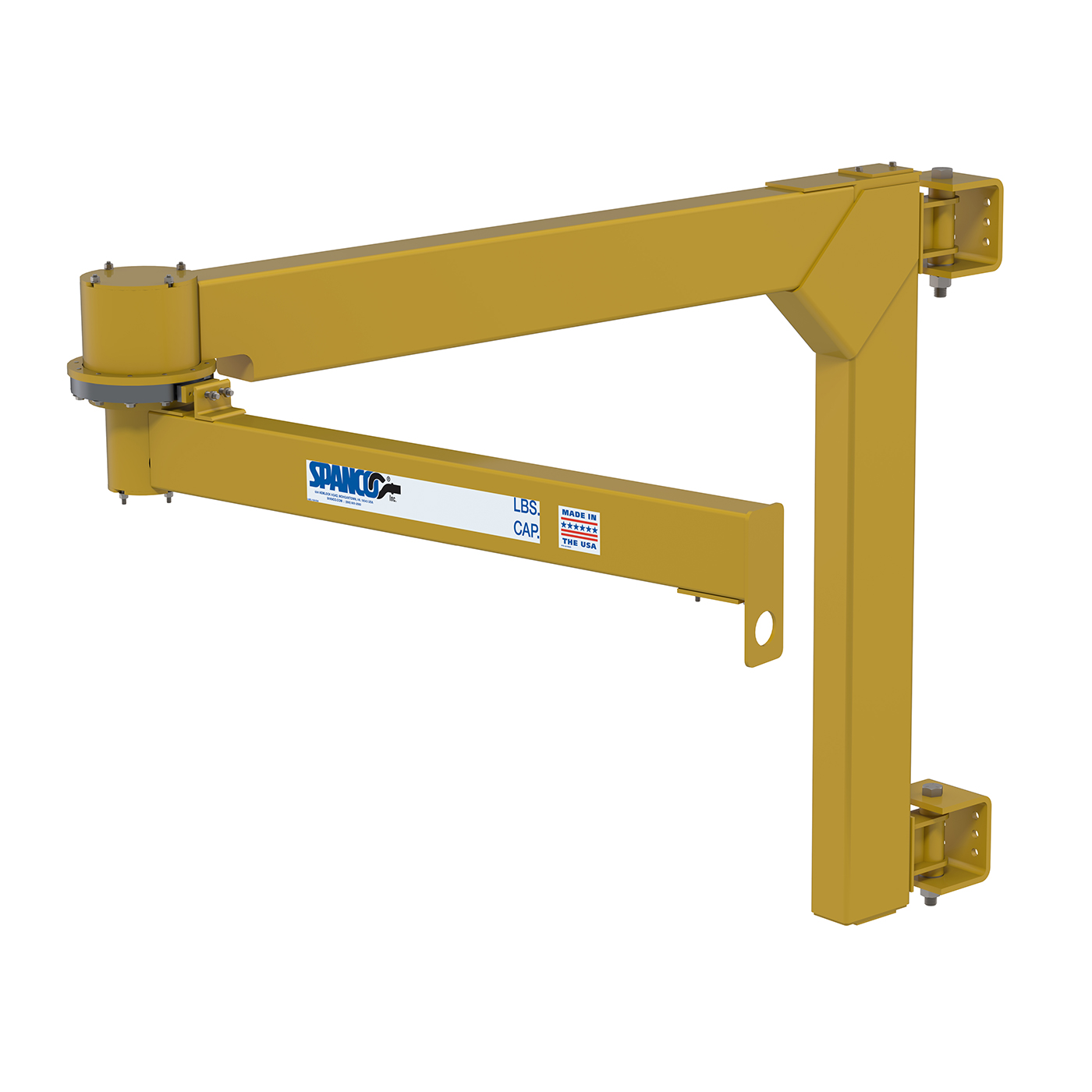Wall-Mounted Jib Cranes— Tie-Rod Supported – 301 Series
- Crane Rotation: 180°
- Spans: up to 30′ standard; longer spans available
- Capacities: up to 5 tons
Spanco Wall-Mounted Jib Cranes require no floor space or foundation. They swing out of the way of overhead cranes and provide great clearance above and below the boom.
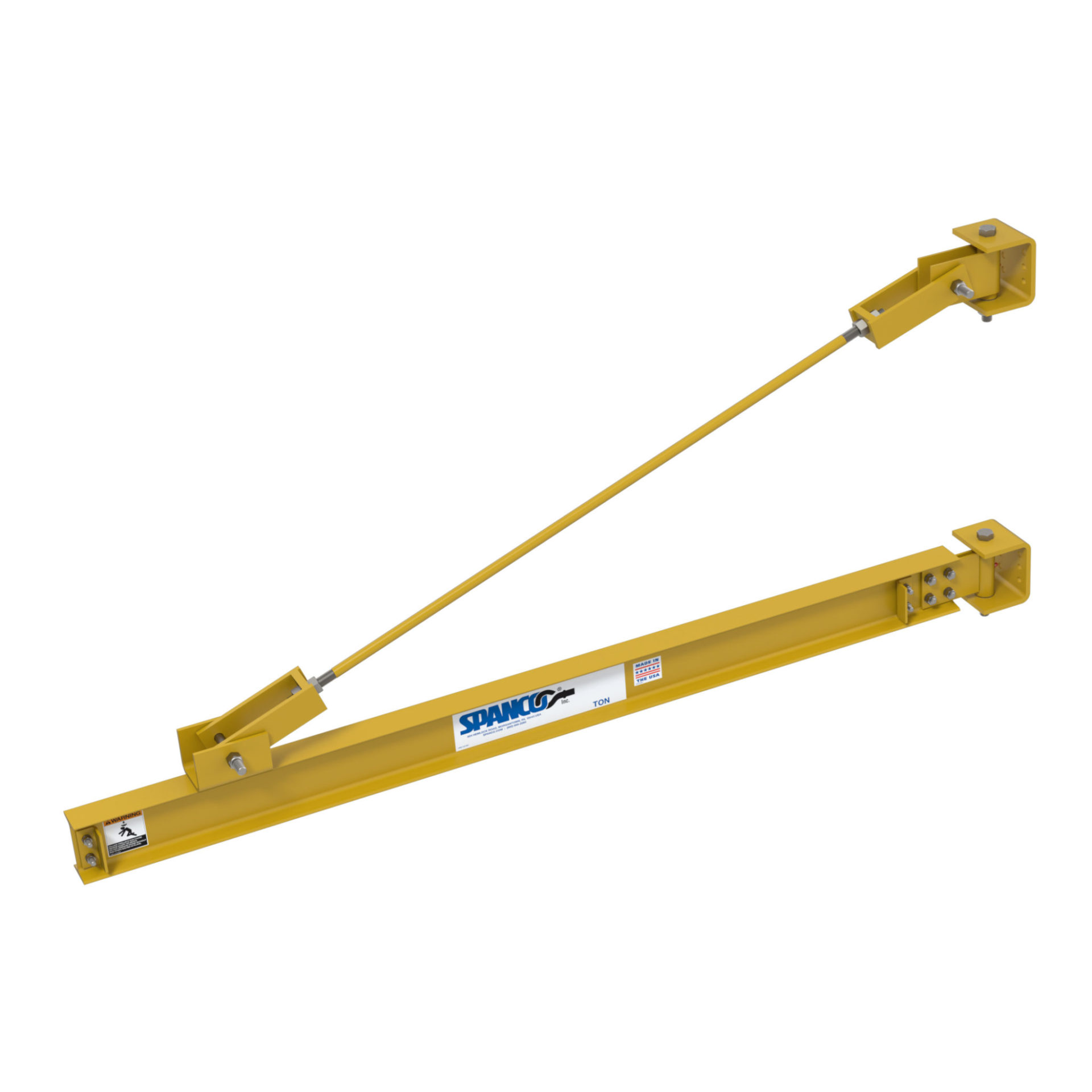
Options & Components
Additional Information
Spanco Wall-Mounted Jib Cranes require no floor space or foundations. They quickly swing out of the way of overhead cranes.
Features of Spanco 301 Series Wall-Mounted Jib Cranes—Tie-Rod Supported
- Our most economical cranes, the Tie-Rod 301 Series, has no support structure under the boom, so the trolley hoists can travel virtually the full length of the boom
- Wall bracket with tie-rod supported boom
- Design uses a standard I-beam and single tie rod to eliminate off-center loading problems
- Top and bottom wall brackets utilize a formed steel channel, with two bronze bushings, bronze thrust washers, and formed tie-rod clevises
- All bolted connections are in double shear
- All swivel connections have bronze bushings and grease fittings to ease rotation, promoting long life and low maintenance
- Transit Company Uses Eight Spanco Jibs To Improve Maintenance Production and Ensure Worker Safety
- Wall-Mounted Jib Crane Provides Full Machining Coverage without Sacrificing Valuable Floor Space
- Water Pump Manufacturer Uses Custom Spanco Jib Cranes to Optimize Material Handling
- RV Manufacturer Finds Unique Application for Jib and Bridge Cranes
- Spanco Wall-Mounted Jib Cranes Provide Efficient Workflow Void of Bottlenecking
- Spanco Wall-Mounted Jib Cranes Provide Lifting Supplement for Leading Manufacturer of Mobile Cranes
Spanco, Inc. warrants its products to be free from defects in material and workmanship as follows:
- Manual Systems & Equipment: Ten Years
- Motorized Systems & Equipment: One Year
- Paint & Finishes for Non-Aluminum Components: Two Years
Ten-Year Warranty Coverage:
- Defects in equipment material and workmanship of manual systems and equipment
- Wearable parts (workstation bridge crane end trucks and hoist trolley wheels only)
Spanco, Inc. warrants its manual workstation bridge crane, jib crane, and gantry crane products to be free from defects in material and workmanship for a period of ten (10) years or 20,000 hours, commencing on the date of shipment to the first retail purchaser. This warranty extends to non-wearable parts only, with the exception of the wheels supplied on manually operated workstation end trucks and hoist trolleys.
One-Year Warranty Coverage:
- Defects in equipment material and workmanship of motorized systems and equipment
Spanco, Inc. warrants motorized equipment to be free from defects in material and workmanship for a period of one (1) year or 2,000 hours, commencing on the date of shipment to the first retail purchaser.
Two-Year Warranty Coverage:
- Paint coatings and finishes for non-aluminum components
Spanco, Inc. warrants its paint and finishes for a period of two (2) years. Warranty claims related to coatings must be accompanied by documentation of the product’s application and environmental conditions from time of delivery to time of claim.
WARRANTY TERMS & CONDITIONS
All warranty claims must be approved by Spanco before any work is performed. Spanco’s obligation under this warranty is limited to the replacement or repair of Spanco products at the factory or separate location approved by Spanco. Other than the above mentioned warranty, Spanco will not honor any other warranties—whether expressed, implied, or statutory—and disclaims any warranties of merchantability or fitness for a particular purpose. Spanco has the right to reject any warranty claim due to harsh and/or inappropriate environmental conditions.
Spanco Is Not Liable for:
- Indirect, incidental, or consequential damages including lost profits, operating costs, loss of production, or travel expenses
- Components or accessories not manufactured by Spanco
- Defective equipment or system failure caused by misuse, negligence, and improper installation or maintenance
- Equipment that has been used in excess of its rated capacity or beyond its service factors
- Equipment that has been altered without Spanco’s written authorization
- Damage incurred by freight carriers
- Any loss, injury, or damage to persons or property resulting from failure or defective operation of material or equipment
Reimbursement Disclaimer:
- Written notice of any claimed system defect must be given to Spanco within ninety (90) days of shipment.
- All requests for reimbursement must be accompanied by proper documentation.
- Reimbursement is provided in the form of a credit unless otherwise approved by Spanco management.
- Reimbursement for labor will be provided at a maximum rate of $75 per hour.
- All reimbursement is subject to approval by Spanco management.
General Design Standards:
Spanco cranes are designed in conformance with the following applicable standards:
- Workstation Bridge Cranes: AISC Steel Construction Manual, OSHA 1910.179, ANSI B30.17, AWS D1.1/D1.6, and MMA MH27.2
- Gantry Cranes: AISC Steel Construction Manual, OSHA 1910.179, ANSI B30.17, AWS D1.1/D1.2/D1.6, and CMAA 74
- Jib Cranes: AISC Steel Construction Manual, OSHA 1910.179, ANSI B30.17, AWS D1.1/D1.6, and CMAA 74
All Spanco cranes have a design factor of 15% of the allowable capacity for the weight of the hoist and 25% for impact.
Fabrication Standards:
All welding performed during the manufacturing of Spanco cranes meets the following American Welding Society’s (AWS) standards: D1.2 for aluminum and D1.1 for steel.
Spanco is officially certified as an AWS Certified Welding Fabricator (CWF). This certification means that not only are all welders AWS Certified, but all processes and procedures adhere to AWS CWF requirements. Examples of requirements include annual calibration of all welding machines and Level 2 visual inspections on all load-bearing components.
Material Standards:
All aluminum used in the manufacturing of Spanco cranes meet ASTM International specification ASTM B308 for 6061-T6 aluminum.
All steel used in the manufacturing of Spanco cranes meets the following applicable ASTM International specifications:
Structural Steel Shapes: ASTM A-36
Structural Steel Pipes: ASTM A-53 Grade B
Structural Square and Rectangular Steel Tubing: ASTM A-500 Grade B
Steel plate and round bar used in Spanco cranes have minimum yield strengths of 36 KSI
Surface Preparation & Painting Procedures:
Spanco adheres to the standards of the Society for Protective Coatings (SSPC) for all product surface preparation. Prior to painting, all Spanco crane components are deburred and descaled using power tools equipped with sanding discs and wire wheels. Components are then washed utilizing a high-pressure/high-temperature biodegradable degreaser solution. Parts are wiped clean and allowed to dry before the painting process. During painting, all components surfaces are coated with a quick drying, semi-gloss enamel, applied to a minimum dry-film thickness of 2 to 3 mils. A finishing coat is applied with a hot, airless, electrostatic spray paint system. Painted components are cured at air temperature.
Deflection Guidelines:
The following guidelines for deflection and stress are followed by Spanco engineers during the crane design process:
- Workstation Bridge Cranes: All models are designed to approximately L/450
- Jib Cranes: Freestanding (100, 101, and 102 Series), Mast Style (200 and 201 Series), Wall-Mounted Cantilever (300 Series), Articulating (400, 401, and 402 Series), and Foundationless models (600 and 605 Series) are designed to approximately L/150; Wall-Mounted Bracket (301 Series) models are designed to approximately L/600 at midspan
- Workstation Jib Cranes: Wall-Mounted (WC Series) models are designed to approximately L/225; Freestanding (FR Series) models are designed to approximately L/150
- Gantry Cranes: All steel series models are designed to approximately L/600; Aluminum models are designed to approximately L/450
Quality Standards:
Spanco is an ISO 9001:2015 Registered corporation. This means that Spanco cranes are manufactured to standards ensuring safety, reliability, and the highest quality. Spanco’s ISO designation also allows for continuous improvement based on customer feedback.
- Inspect entire system annually or more frequently as defined by OSHA 1910.179. Inspection must be performed by a qualified person. Failure to do so may cause serious injury or death.
- This equipment, used as a crane, is not in any way designed for lifting, supporting, or transporting humans. Failure to follow specified load limitations can result in serious bodily injury or death.
- The rated load of the hoist as marked on the hoist must not exceed the rated capacity of the jib as labeled on the boom. Do not install a hoist with a capacity greater than that of the jib.
- It is solely the customer’s responsibility to provide suitable mounting supports for the jib crane. Spanco recommends that the customer consult a qualified professional architect or engineer in your local area to determine the adequacy of the building support. There should be no deviation from the recommended foundation size or installation recommendations without first consulting a qualified professional. Failure to check this item can result in serious bodily injury or death.
- Do not impact end stops at speed. Only impact end stops with caution.
- Never use end stops for repetitive boom impacts.
- To prevent trolley from running off of the boom, do not operate crane without end stop bolt firmly secured in place on the end of the boom.
- Do not operate hoist or crane if cotter pins are not in place and properly bent over on both sides of hoist trolley. Check regularly that the cotter pins are in place and securing the hoist on the hoist trolley.
- Inspect jib for missing or broken parts before operating.
- Do not adjust or disassemble crane when jib is under load.
- When moving jib, position the load in the center of the boom.
- Be certain the load is directly beneath boom before load is lifted. Do not pull sideways on crane.
- Ensure the load is not attached to the floor and remove any obstacles that impede lifting.
- Adjustments and/or repairs should be made in an area where it will have the least interference with operation.
- Never stand under jib when disassembling crane.

